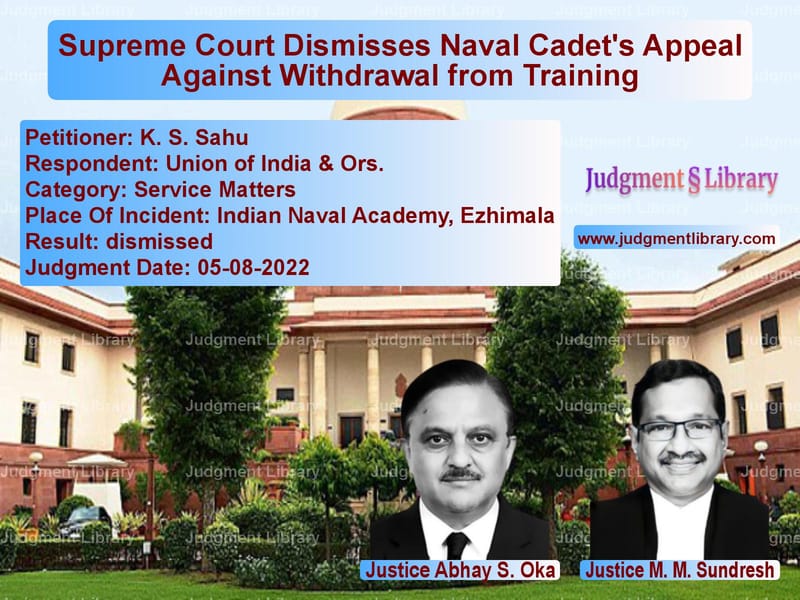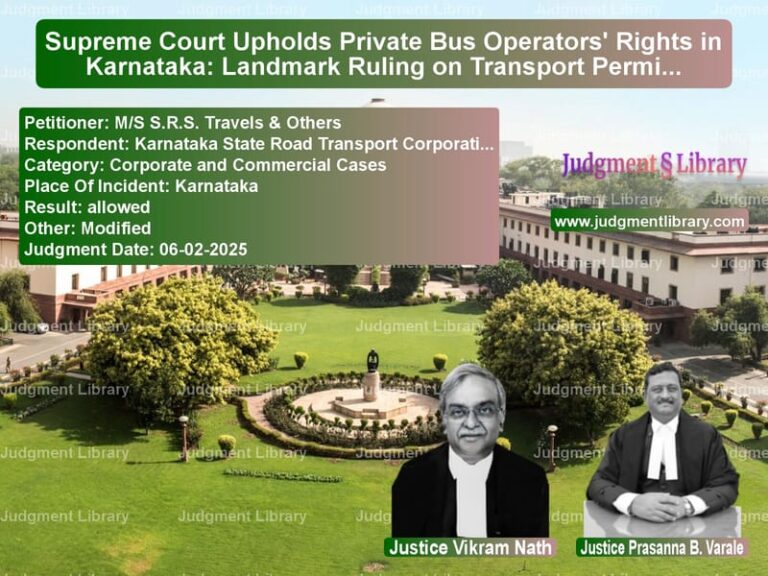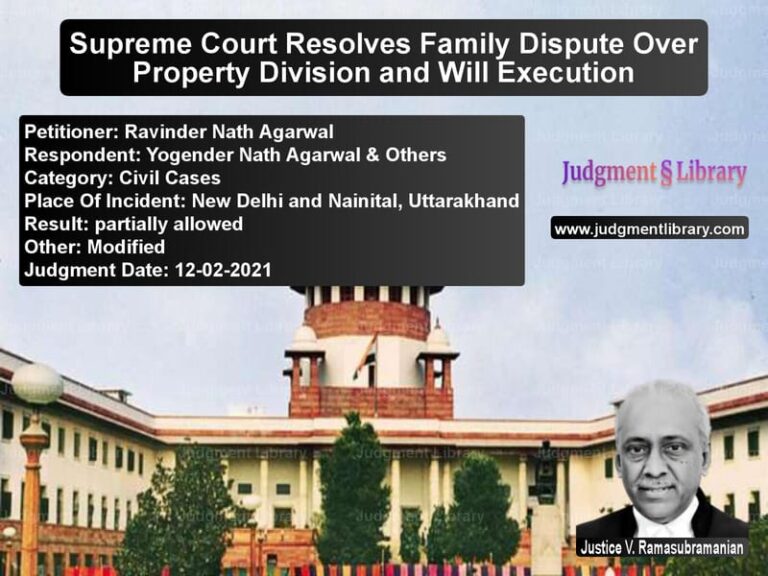Supreme Court Dismisses Naval Cadet’s Appeal Against Withdrawal from Training
The Supreme Court ruled against an appeal filed by K.S. Sahu, a naval cadet who was withdrawn from officer training at the Indian Naval Academy (INA) due to deficiencies in character and officer-like qualities. The appeal, challenging his withdrawal, was dismissed by the Court, affirming the decision of the Armed Forces Tribunal (AFT).
Background of the Case
K.S. Sahu joined the Indian Navy as a sailor on July 31, 2002, and was later selected for officer training at INA. After completing his initial training at INS Mandovi, Goa, he proceeded to INA, Ezhimala, to complete his 5th and 6th terms of training. However, on December 1, 2010, the Ministry of Defence issued a communication approving his withdrawal from INA, reverting him to his original rank as a sailor.
Read also: https://judgmentlibrary.com/supreme-court-remands-industrial-dispute-case-for-fresh-consideration/
Aggrieved by this decision, Sahu filed an Original Application before the Armed Forces Tribunal, arguing that the withdrawal was arbitrary and violated principles of natural justice. The Tribunal dismissed his application, leading to this appeal before the Supreme Court.
Key Issues Raised in the Appeal
The case involved three key legal questions:
- Whether a service cadet can be withdrawn from INA without following the principles of natural justice.
- Whether Regulation 216 of the Navy (Discipline and Miscellaneous Provisions) Regulations, 1965, applies to a service cadet.
- Whether withdrawal after completion of the course and receipt of certificates is legally valid.
Arguments by the Appellant (K.S. Sahu)
- The appellant contended that the decision to withdraw him was taken without following due process and violated principles of natural justice.
- He argued that as per the Navy’s own rules, the final authority for withdrawal should have been the Government, but in his case, the decision was taken by a subordinate authority.
- He alleged that he was victimized due to his humble background, as his father worked as a carpenter in a naval establishment.
- He claimed that he was pressured into signing documents accepting his mistake under the threat of disciplinary action.
- He highlighted that despite the alleged deficiencies in his conduct, the authorities sent an invitation to his parents for the valedictory ceremony, showing inconsistency in their actions.
Arguments by the Respondent (Union of India)
- The government argued that Sahu’s withdrawal was based on his failure to meet officer-like qualities, not on disciplinary grounds.
- The authorities had issued two written warnings on July 16, 2009, and May 11, 2010, calling upon him to improve his conduct.
- The appellant was found in possession of prohibited items such as a mobile phone, cigarettes, pornographic magazines, and government property, including an INS Garuda Pay office stamp.
- After multiple assessments and warnings, it was determined that he lacked the necessary qualities to be an officer, leading to his withdrawal.
- The action was taken under the rules governing naval training, which explicitly allow for withdrawal on grounds of deficient character and officer-like qualities.
Supreme Court’s Observations
The Supreme Court analyzed the regulations governing the withdrawal of cadets and noted that Regulation 216, which deals with dismissal for misconduct, was not invoked in this case. Instead, Sahu’s withdrawal was based on his failure to meet officer-like qualities.
Read also: https://judgmentlibrary.com/supreme-court-denies-compassionate-appointment-for-bank-employees-son/
Regarding procedural fairness, the Court observed:
“At least on two occasions, the appellant was put to notice and given an opportunity to explain his conduct. The competent authority assessed his performance and behavior over a period of time before making the decision.”
The Court rejected the argument that the final approval should have come from the Government, noting that the Chief of Personnel (COP) had been delegated the authority to withdraw cadets.
On the appellant’s claims of victimization, the Court stated:
“The appellant’s own admissions regarding possession of prohibited items and tampering with official documents confirm the findings against him.”
Supreme Court’s Verdict
The Supreme Court upheld the decision of the Armed Forces Tribunal and dismissed the appeal, concluding:
- The withdrawal was legally valid and based on sufficient evidence.
- The appellant was given due opportunities to improve and failed to meet the required standards.
- The withdrawal did not terminate his service; he was reverted to his original rank as a sailor.
Impact of the Judgment
This ruling reinforces the importance of discipline and officer-like qualities in the armed forces. It also establishes key legal principles regarding the withdrawal of cadets:
- Cadets can be withdrawn for failing to meet character and officer-like qualities, even if they are not guilty of disciplinary violations.
- Regulation 216 does not apply in cases of withdrawal for deficiencies in character and leadership qualities.
- The competent authority within the Navy has the power to approve withdrawals without direct intervention from the Government.
- The process followed in Sahu’s case met the necessary procedural fairness standards.
By upholding the Navy’s decision, the Supreme Court has reinforced the principle that the armed forces require not just academic excellence but also high standards of conduct and discipline for those aspiring to become officers.
Petitioner Name: K. S. Sahu.Respondent Name: Union of India & Ors..Judgment By: Justice Abhay S. Oka, Justice M. M. Sundresh.Place Of Incident: Indian Naval Academy, Ezhimala.Judgment Date: 05-08-2022.
Don’t miss out on the full details! Download the complete judgment in PDF format below and gain valuable insights instantly!
Download Judgment: k.-s.-sahu-vs-union-of-india-&-ors-supreme-court-of-india-judgment-dated-05-08-2022.pdf
Directly Download Judgment: Directly download this Judgment
See all petitions in Disciplinary Proceedings
See all petitions in Public Sector Employees
See all petitions in Judgment by Abhay S. Oka
See all petitions in Judgment by M.M. Sundresh
See all petitions in dismissed
See all petitions in supreme court of India judgments August 2022
See all petitions in 2022 judgments
See all posts in Service Matters Category
See all allowed petitions in Service Matters Category
See all Dismissed petitions in Service Matters Category
See all partially allowed petitions in Service Matters Category







